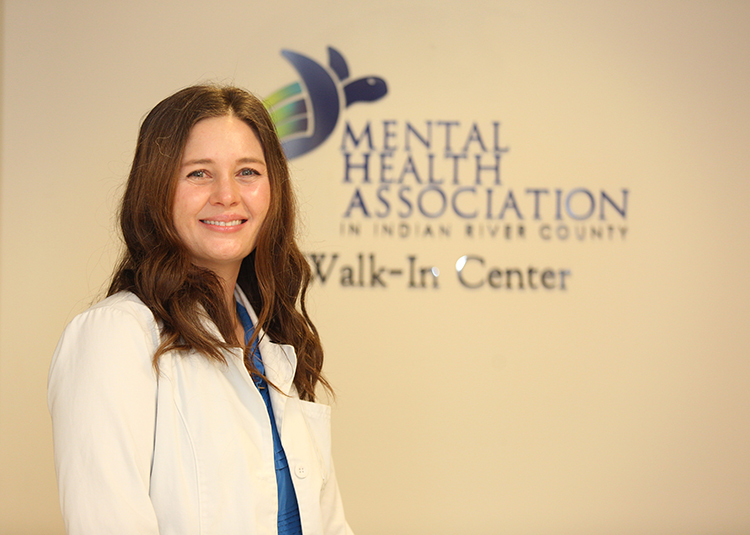Even if you were one of the lucky ones who didn’t get COVID, it doesn’t mean that your health hasn’t been affected by the pandemic. Dr. Jessica Olsen, a psychiatrist with the Mental Health Association in Indian River County, said there’s been a surge of people seeking help for mental and emotional problems as they isolated in place and now as they integrate back into society.
“In the beginning of the pandemic life was put on hold and everyone just did what was asked of them,” said Dr. Olsen. “People watched the news and isolated as directed. Everything was quiet. But about six months into the restrictive lifestyle we saw an influx of people feeling anxious and depressed. There are a lot of people who live alone, and without any social interaction they started to get stir crazy.”
In addition, the pandemic proved to be the perfect storm for those already suffering from depression or anxiety. Instead of making a personal choice to isolate and avoid interaction, that choice was thrust upon us and many people with underlying baseline anxiety or depression felt their symptoms intensify when their daily routines were halted.
“We are all on this proverbial hamster wheel, working, socializing, exercising and living a very busy lifestyle. The virus forced us to stop and slow down,” explained Dr. Olsen. “Some of us had never had idle time before and had to train ourselves to adapt.”
Aware of the need, the Mental Health Association never closed its doors during the pandemic, but many who needed help were hesitant to venture out from their homes. Those patients could still get help via telehealth and speak to a clinician or counselor to work through their anxiety.
“None of us are ‘normal,’” stressed Dr. Olsen. “We are all somewhere on the spectrum of mental health and we all fluctuate where we are on that. We all got amped up in some way because of the virus. Most of our patients still prefer face-to-face interaction, but with a vulnerable population it made good sense to stay in the safety of their own homes.”
The truth of the COVID-19 mental health crisis is in the numbers. At the nonprofit Mental Health Association Walk-In & Counseling Center, 47 percent of walk-in screenings said COVID had negatively affected their mental health; 42 percent reported an increase in the intensity of symptoms since the pandemic started; while 36 percent reported the onset of new or emerging symptoms. Substance abuse also has escalated during the pandemic as people used alcohol and drugs to self-medicate their anxiety or depression.
“Mental health has a stigma which causes some to suffer in silence and that stigma is a killer,” Dr. Olsen said. “It needs to be normalized so that seeking help is not associated with weakness. Not everyone can handle everything life throws at them. The pandemic has brought to light what we are missing in our coping skills. Quite frankly, life is all about developing coping mechanisms to handle what life throws you.”
Exercise is one of the best coping mechanisms. Go for a walk, jump in the pool or just do some sort of physical activity during the day. Your mind craves the energy burn, and without exercise, that nervous energy just rotates around in your mind.
Another simple technique to relieve stress and anxiety is deep breathing. We are all so tense and high-strung that we build up tension in the body. If you are feeling anxious or experience nausea or headaches, take a few deep breaths, which delivers oxygen the body craves.
Longer periods of deep breathing activate the parasympathetic nervous system, which sends a signal to your brain to tell the anxious part that you’re safe, counteracting the fight, flight or freeze impulse of the sympathetic nervous system. Deep breathing can be done at your desk without being noticed. You can also tense and relax muscles beginning at the head or toes and working your way up or down the body. Before you are done you will be more relaxed.
The most important thing to remember is that it is ok to get help. The Mental Health Association is open Mon-Fri 8:30-5 pm and you can walk in for a screening without an appointment. Fees are charged on a sliding scale basis making it affordable and accessible to everyone.
“We have a multidisciplinary team of counselors and doctors who work together to figure out the best treatment options for the individual,” explained Dr. Olsen.
“We are a therapy-first model and try to work through things before resorting to medication. Many fear that medication will make you feel happy or feel nothing at all. The truth is medication should make you feel like yourself. You should feel happy when something good happens, and sad when something bad happens. If your medication is masking those emotions, it is either too strong or not right. Medicine shouldn’t bury emotions and it can often be only used temporarily while you are working through something.”
All the changes that occurred during the pandemic weren’t necessarily negative. The lack of human connection made us all realize how important those relationships are to our mental well-being. People are tired of being cooped up and alone, and grateful to be able to resume a familiar lifestyle inclusive of family and friends. Everyone is at a different level of entry, however, so we need to be mindful of others and extend kindness.
Dr. Jessica Olsen is a licensed psychiatrist who joined the Mental Association last October in the middle of the pandemic. She graduated from St. George’s University School of Medicine and completed a fellowship in pain management at the Medical College of Georgia. The pandemic inspired her to leave her pain management practice to help those suffering from the emotional stresses of this challenging time. Dr. Olsen can be reached at the Mental Health Association in Indian River County, 820 37th Place, Vero Beach, 772-569-9788.

